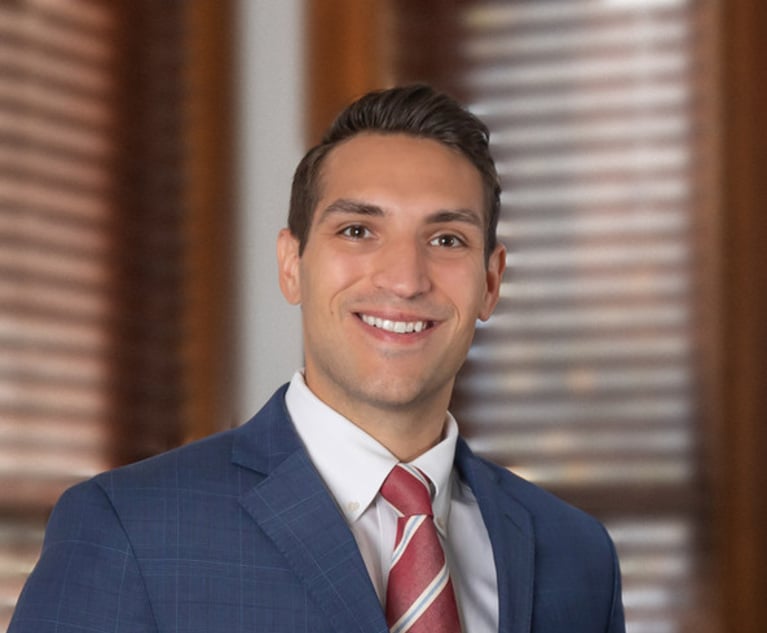Connecticut Supreme Court Nixes Exception to Liability Immunity Over Deadly Police Chase
The sole issue was whether a town and its police officers were afforded immunity from liability for engaging in a high-speed pursuit of a car with a teenage passenger.
June 26, 2020 at 08:08 AM
4 minute read
 Connecticut Supreme Court building in Hartford. Photo: Michael Marciano/ALM
Connecticut Supreme Court building in Hartford. Photo: Michael Marciano/ALM
The Connecticut Supreme Court set precedent this week in ruling that a municipality has governmental immunity from liability in a police chase that ended in the death of a teenage passenger.
The sole issue at stake was whether a town and its police officers are afforded governmental immunity from liability for the decision to engage in a high-speed pursuit that, in this case, lasted just two minutes.
In writing for the majority in the 6-1 Wednesday ruling, Justice Maria Araujo Kahn said that the identifiable victim-imminent harm exception does not apply. That exception refers to whether, in this case, a police officer can see the person he or she is pursuing in the vehicle.
The family argued that the officer could see 15-year-old passenger Brandon Giordano in the pursued vehicle and, therefore—per the exception—should not have chased it.
Siding with Kahn were Chief Justice Richard Robinson and Justices Richard Palmer, Andrew McDonald, Gregory D'Auira and Raheem Mullins. Justice Steven Ecker dissented.
"If we were to agree with the plaintiff, the identifiable victim-imminent harm exception would apply to every police pursuit, and the exception would swallow the rule," the court's majority said.
The case involved the Seymour Police Department and officer Anthony Renaldi, who was involved in the police chase that ended in the death of Giordano.
The Ansonia-Milford Superior Court had granted summary judgment to the defense to dismiss the lawsuit based on governmental immunity and the Supreme Court affirmed that decision.
"This ruling sets precedent," said defense counsel Thomas Gerarde. "The lower courts were not uniformed in their assessment of whether a police officer would be entitled to discretionary act immunity when initiating a police pursuit."
Gerarde of Howd & Ludorf in Hartford, who represented the police department and the officer, continued: "The lower courts were all over the place and the Supreme Court in this state has now put to rest the issue when it deals with police initiating a pursuit."
Giordano's family had maintained that there were exceptions to the governmental immunity rule, namely as it applied to the identifiable victim-imminent harm exception. In addition, the family appealed the lower court's ruling which said the officer had a discretionary rather than ministerial duty to drive with "due regard for the safety of all persons and property." The family sued for $15 million in its 2014 lawsuit.
Giordano was a passenger in the back seat of a Mustang that friend Eric Ramirez was driving. Renaldi stopped the vehicle because it had activated a set of lights that were affixed to the undercarriage, commonly referred to as "underglow lights," which are illegal in Connecticut.
Ramirez sped away and Renaldi followed at a high rate of speed with his emergency lights and siren activated, Kahn wrote. Renaldi lost sight of the Mustang in less than two minutes, but the car hit an embankment and flipped onto its roof, killing Giordano.
In a scathing 69-page dissent, Ecker wrote, "For the first time in Connecticut's history, and in direct contravention of numerous statutes reflecting our Legislature's opposite policy choice, the majority extends immunity to municipal employees whose negligent operation of a motor vehicle on a public road has caused bodily injury or death."
Gerarde said the ruling "was a long time coming. I'm not surprised by the ruling because the courts have come to realize discretionary act immunity is proper for the functioning of Connecticut municipalities." Assisting Gerarde was colleague Kristan Maccini.
Representing Giordano's family were Steven Errante and Matthew Popilowski of Lynch, Traub, Keefe & Errante in New Haven.
"I'm not shocked because that is the direction the supreme and appellate courts have been going in," Errante said Thursday. "It probably spells the death knell for municipal liability cases unless you are a child within schools hours, because they are compelled to be in school and are given certain protections." Giordano was of school age, but was in the car after school hours.
Errante continued: "I think you'll find plaintiff lawyers will now not be taking these cases no matter how serious they are, even if they have a death, because it's impossible to recover damages."
Related stories:
Middletown Attorneys Go the Extra Mile—Literally—for Quadriplegic Client
New London Attorney Secures $1.1 Million Settlement for Client After Car Crash
This content has been archived. It is available through our partners, LexisNexis® and Bloomberg Law.
To view this content, please continue to their sites.
Not a Lexis Subscriber?
Subscribe Now
Not a Bloomberg Law Subscriber?
Subscribe Now
NOT FOR REPRINT
© 2025 ALM Global, LLC, All Rights Reserved. Request academic re-use from www.copyright.com. All other uses, submit a request to [email protected]. For more information visit Asset & Logo Licensing.
You Might Like
View All
Apple Disputes 'Efforts to Manufacture' Imaging Sensor Claims Against iPhone 15 Technology

Patent Disputes Over SharkNinja, Dyson Products Nearing Resolution
Law Firms Mentioned
Trending Stories
Who Got The Work
J. Brugh Lower of Gibbons has entered an appearance for industrial equipment supplier Devco Corporation in a pending trademark infringement lawsuit. The suit, accusing the defendant of selling knock-off Graco products, was filed Dec. 18 in New Jersey District Court by Rivkin Radler on behalf of Graco Inc. and Graco Minnesota. The case, assigned to U.S. District Judge Zahid N. Quraishi, is 3:24-cv-11294, Graco Inc. et al v. Devco Corporation.
Who Got The Work
Rebecca Maller-Stein and Kent A. Yalowitz of Arnold & Porter Kaye Scholer have entered their appearances for Hanaco Venture Capital and its executives, Lior Prosor and David Frankel, in a pending securities lawsuit. The action, filed on Dec. 24 in New York Southern District Court by Zell, Aron & Co. on behalf of Goldeneye Advisors, accuses the defendants of negligently and fraudulently managing the plaintiff's $1 million investment. The case, assigned to U.S. District Judge Vernon S. Broderick, is 1:24-cv-09918, Goldeneye Advisors, LLC v. Hanaco Venture Capital, Ltd. et al.
Who Got The Work
Attorneys from A&O Shearman has stepped in as defense counsel for Toronto-Dominion Bank and other defendants in a pending securities class action. The suit, filed Dec. 11 in New York Southern District Court by Bleichmar Fonti & Auld, accuses the defendants of concealing the bank's 'pervasive' deficiencies in regards to its compliance with the Bank Secrecy Act and the quality of its anti-money laundering controls. The case, assigned to U.S. District Judge Arun Subramanian, is 1:24-cv-09445, Gonzalez v. The Toronto-Dominion Bank et al.
Who Got The Work
Crown Castle International, a Pennsylvania company providing shared communications infrastructure, has turned to Luke D. Wolf of Gordon Rees Scully Mansukhani to fend off a pending breach-of-contract lawsuit. The court action, filed Nov. 25 in Michigan Eastern District Court by Hooper Hathaway PC on behalf of The Town Residences LLC, accuses Crown Castle of failing to transfer approximately $30,000 in utility payments from T-Mobile in breach of a roof-top lease and assignment agreement. The case, assigned to U.S. District Judge Susan K. Declercq, is 2:24-cv-13131, The Town Residences LLC v. T-Mobile US, Inc. et al.
Who Got The Work
Wilfred P. Coronato and Daniel M. Schwartz of McCarter & English have stepped in as defense counsel to Electrolux Home Products Inc. in a pending product liability lawsuit. The court action, filed Nov. 26 in New York Eastern District Court by Poulos Lopiccolo PC and Nagel Rice LLP on behalf of David Stern, alleges that the defendant's refrigerators’ drawers and shelving repeatedly break and fall apart within months after purchase. The case, assigned to U.S. District Judge Joan M. Azrack, is 2:24-cv-08204, Stern v. Electrolux Home Products, Inc.
Featured Firms
Law Offices of Gary Martin Hays & Associates, P.C.
(470) 294-1674
Law Offices of Mark E. Salomone
(857) 444-6468
Smith & Hassler
(713) 739-1250












